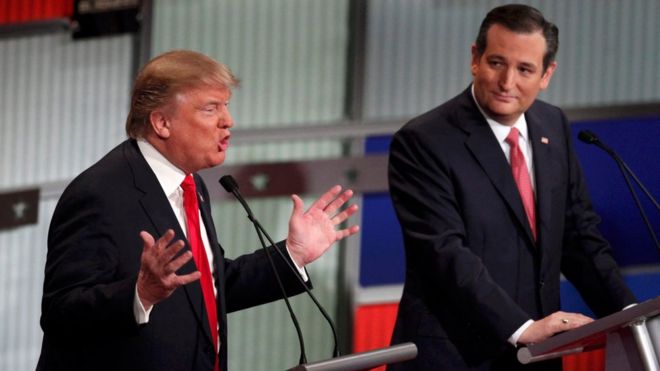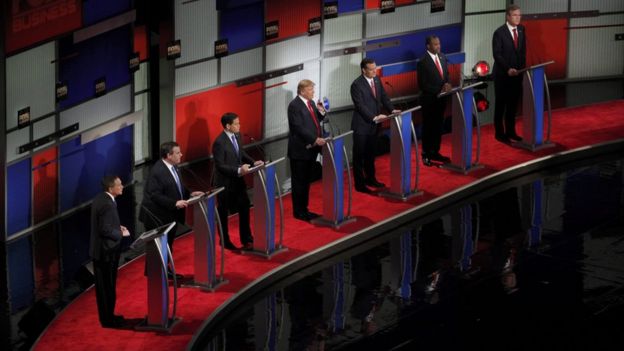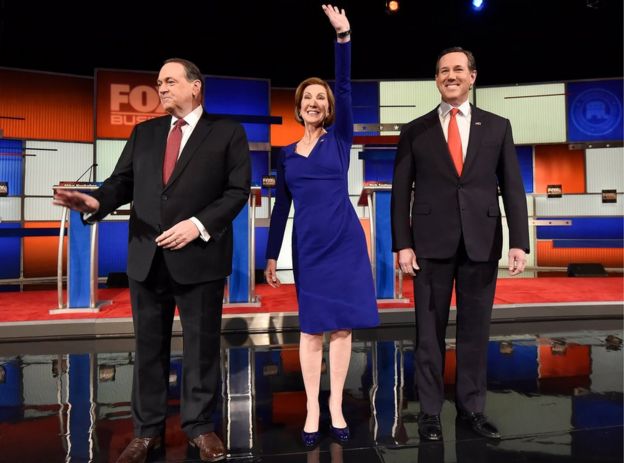Republican debate: Trump challenges Cruz over Canada birth
- 2 hours ago
- US Election 2016
 Reuters
Reuters
Republican frontrunner Donald Trump has attacked Ted Cruz over his birth in Canada, saying it raised questions about his presidential eligibility.
In the latest Republican debate for White House hopefuls, Mr Trump told his rival: "There's a big question mark over your head."
The constitution mandates the president be a "natural born citizen" of the US.
Issues of national security, the economy and foreign policy have also played heavily in the debate.
In the polls, the pair are leading the five other candidates who were also on the stage in North Charleston.
The debate came just two weeks before the first real test of the campaign, when voters in Iowa pick their Republican and Democratic choices for president.
Highlights:
- Mr Cruz defended a controversy over his campaign finances in 2012, alleging bias in the media
- And he said Mr Trump embodied "New York values," saying "not a lot of conservatives come out of Manhattan - I'm just saying"
- Mr Trump defended his call for a halt on Syrian refugees, saying they were a "Trojan horse" bringing in people who would harm the US
- But he came under fire from Florida Governor Jeb Bush for proposing a ban on Muslims coming to the US
- Florida Senator Marco Rubio said Mr Obama would confiscate every gun in the US if he could
- The candidates bickered over how to respond to China's impact on the US economy
Analysis - Anthony Zurcher, BBC News, Washington
The sixth Republican presidential debate was the political equivalent of a wrestling "battle royale", where fists fly, chairs are thrown, the crowd cheers and the referees flee for safety.
There could have been no clearer indication that the Cruz-Trump honeymoon is over. The two candidates who stand atop the Republican presidential opinion polls had exchanged warm words through much of the campaign, but with the Iowa caucuses just two weeks away, the niceties have melted away.
They exchanged barbs over Mr Cruz's Canadian birthplace and Mr Trump's alleged liberal "New York values".
From there, numerous side fights broke out. Rubio v Christie over Mr Christie's tenure as New Jersey governor. Trump v Kasich, Rubio v Bush on trade. Rubio v Cruz on immigration. Each candidate could boast a strong moment or two, but each also felt the sting of their competitors' barbs.
A battle royale is supposed to end when only one participant is left standing. In Charleston, however, all the candidates survived - but all were bloodied.
 Reuters
Reuters AP
AP
The event hosted by Fox Business Network came after days of Mr Cruz and Mr Trump taking shots at each other, shattering a months-long period of goodwill between the two men.
The start of hostilities began a week ago when the billionaire businessman started raising questions about whether the Texas senator's birth in Canada put his eligibility in doubt.
But on the debate stage on Thursday night, Mr Cruz said there was "zero chance" of a lawsuit succeeding, because the constitution's definition of "natural born citizens" included people born to an American parent.
Mr Cruz was born in Calgary to an American mother and a Cuban father.
But the business mogul stood firm, noting that a Harvard law scholar had raised doubts and Mr Cruz could face lawsuits by Democrats wishing to challenge his qualification.
Candidates for US president must:
- be a "natural born citizen" - this has never been tested in court but is widely interpreted as being a US citizen at birth, so born in the US or having a US citizen parent
- be 35 years of age or older
- have lived in the US for the past 14 years
They also argued over the meaning of "New York values", which Mr Cruz threw at the New York billionaire as a slur on his conservative credentials.
But the New Yorker said that was an insult to the "great people" who pulled together after the 9/11 attacks.
After the debate, Mr Trump told reporters: "I guess the bromance is over."
All the candidates targeted leading Democratic candidate Hillary Clinton, who was repeatedly attacked for her time as Secretary of State.
The primary contests, in which each party picks their nominee for president, begin in February and the presidential election is in November.
- 22 things that Donald Trump believes
- Is this man Hillary Clinton's worst nightmare?
- What Jeb could learn from George
- 2016 Republican message mash-up
- The rude, vulgar US presidential election
- Is Donald Trump a Democratic secret agent?
- Who might stop Trump from nomination win?
- The full 2016 field
- Is Donald Trump destroying the Republican Party?
- A Republican party split in two
- The Trump and Carson phenomenon explained
- Donald Trump wants to deport every single illegal immigrant - could he?
- Five reasons Marco Rubio may stumble
- Ben Carson compares abortion to slavery
- The brain surgeon with presidential
No comments:
Post a Comment
Please leave a comment-- or suggestions, particularly of topics and places you'd like to see covered